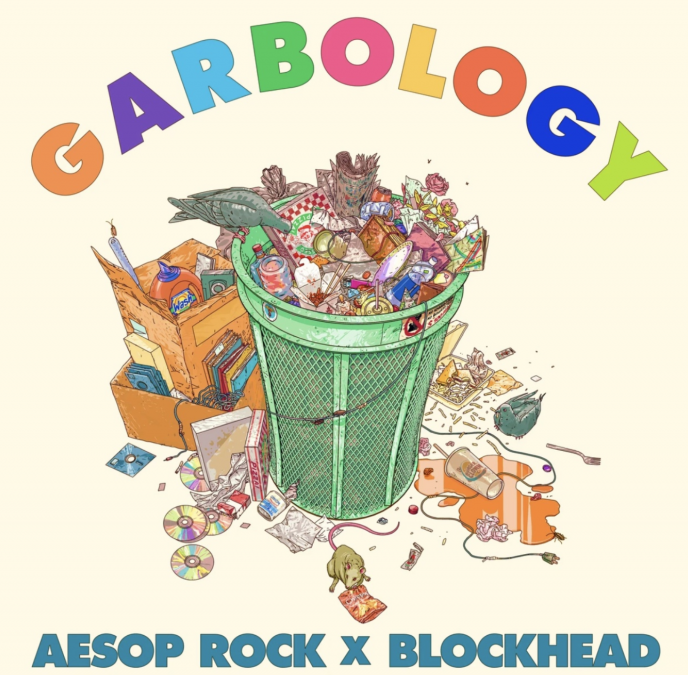
Aesop Rock x Blockhead's 'Garbology' Doesn't Require Sifting Through Trash To Find The Gems
 87
87  88
88 Aesop Rock and producer Blockhead’s collaborative relationship stretches back to the late 1990s when Definitive Jux was the premiere independent Hip Hop label. Co-founded in New York City by Amaechi Uzoigwe and El-P, who was a member of Company Flow long before Run The Jewels was even a granular idea, the label helped propel the careers of Del The Funky Homosapien, Murs, RJD2 and, of course, Aesop Rock.
During those early days, Aesop and Blockhead routinely made magic on songs such as “Daylight” from 2001’s Labor Days and the title track from 2007’s None Shall Pass. Outside of Blockhead’s work with Aesop Rock, the Manhattan native has crafted a small arsenal of solo albums that are unusually flawless in their execution. For the most part, not one song is skippable. His ability to weave sonic tapestries together into a warm and welcoming enclave of complex compositions seems to come effortlessly. So it’s surprising it took nearly 25 years for Blockhead and Aesop Rock to do an entire album together. But it turns out the COVID-19 pandemic does have some perks — and one of those perks is the birth of Garbology, the duo’s first collaborative project.
The 14-track effort was preceded with a video for “Jazz Hands,” which wasn’t exactly the best choice for the lead single now knowing there were more dynamic options. “Jazz Hands” slightly suffers from a minimalist beat that doesn’t really go anywhere until the 70-second coda but does allow Aesop’s signature wordplay wizardry to take centerstage. As the song fades out and “Wolf Piss” begins to flow, it becomes quickly apparent how intune their chemistry really is. Aesop rides the pendulous boom-bap like the vet he is, while Blockhead’s expert production swells with high hats and the occasional Middle Eastern guitar.
Aesop Rock’s lyrics have become increasingly more coherent over the years, which started to become evident on 2014’s The Impossible Kid and, more recently, 2020’s Spirit World Field Guide. While his bars are still a labyrinthian challenge for anyone without a dictionary on hand, his verses are more anecdotal than previous efforts. Like on “Legerdemain,” Aes tells the tale of some mysterious trip to the woods that led to him going home “different.” As jazz horns ebb and flow in the background, Aes also proves his ironic sense of humor is still intact with the line, “Today a mall cop told me I should get a life …” The song then momentarily comes to a halt, ensuring the listener will grasp the ridiculousness of the statement.
Famously introverted, private and borderline agoraphobic, Aesop peeks out from behind the curtain a bit on “Difficult” and admits people often have him misunderstood with, “Folk say I’m difficult/I’m too stubborn/It’s funny, I’m real easy/Y’all buggin’.” Aesop’s preference for email interviews and aversion to social media might say otherwise but anyone who’s met Aesop will admire his gentle kindness. But on the mic, all bets are off and he’s willing to tell the truth — at least his version of it.
On “Flamingo Pink,” which employs an arpeggio of dark piano notes and a light flute, Aesop seems to have an epiphany: “Good goddamn, good goddamn/Every idol I ever met is a conman/Good God, good God, good goddamn” before suggesting he’s been taking time out for his mental health.
“You laughing because I’m different, I’m laughing ’cause you the same,” he spits. “I been discovering a distant corner of the human brain/Whose function is to see you rue the day that you rebuke the name.”
As expected, Aesop Rock’s rhymes are packed to the brim with endless adjectives, deep metaphors and fragmented phrases, and when they fit together like a puzzle, it’s truly astounding. His pen game is nearly otherworldly — but that can also be his Achilles heel.
Every spin is undoubtedly an exercise in active listening; an Aesop Rock album isn’t a casual affair. Close attention is required to grasp the nuances and cleverness of his writing. But for those who appreciate the creative lyricism he consistently slings and Blockhead’s dreamy, layered production, Garbology isn’t likely to end up in the trash.
REPEAT ME:
FAN FEEDBACK:
I know everybody feels like their favorite music speaks especially to them, but holy crow Aesop Rock's recent stuff feels like it sees me. Spirit World Field Guide and Garbology have been in constant rotation, and this stuff just MAKES SENSE.
— SB (@SBMakesStuff) December 10, 2021
76. Garbology – Aesop Rock & Blockhead
Aesop Rock proves why he is one of the best underground rappers of all time. Solid bars throughout. The production definitely keeps your attention and fits the flow very well. Definitely a classic. pic.twitter.com/bdmvIWUZ54
— ?Aquaberry Dolphin? (@Southside_Gunn) December 10, 2021
Listened through a bit of Garbology by Aesop Rock and I’m not the biggest fan? Instrumentals don’t feel as varied as SWFG to me
— (@ZackTheNerd) December 6, 2021


